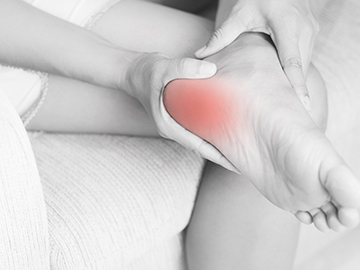
What is a Fasciotomy?
A fasciotomy is a surgical procedure that cuts a portion of the plantar fascia to reduce the tension on it. The plantar fascia is a thick almost web-like ligament that connects your heel to the front of your foot to help you walk. A fasciotomy is one way to treat plantar fasciitis, which is one of the most common podiatric problems encountered by Medical Foot Solutions. Plantar fasciitis can be extremely painful and frequently hinders a patient’s mobility and limits their daily activities.
A fasciotomy involves making a small incision (approximately 5 mm) near the heel. The plantar fascia is then identified and is partially severed. It is a minimally invasive procedure that carries a very high rate of success. Typically a single suture is required to close the incision site, which is removed 10 days later. This procedure has minimal down time for the patient, and they can ambulate immediately after the surgery.
Potential Causes of Plantar Fasciitis
Your plantar fascia is similar in shape to that of a bowstring that supports the arch of your foot and absorbs shock when you run, walk and jump. If tension and stress on this bowstring become too excessive, small tears can occur in the fascia, which can become irritated and inflamed. This irritation and inflammation can cause severe pain.
Although plantar fasciitis can occur without an obvious cause, there are a few factors that can increase your risk of developing this painful condition.
- Age - Your age can play a role, as this condition is commonly seen in people between the ages of 40 and 60.
- Certain types of activities – Some activities and exercises that place a lot of stress on your heel and the attached tissue, such as long-distance running, ballet dancing and aerobic dancing, can encourage the onset of plantar fasciitis.
- Foot type - If your feet are misaligned (flat feet, or a high arch), you may be at a higher risk of needing to have a fasciotomy performed.
- How you walk – Sometimes, how you walk can cause weight to be distributed unevenly on your feet and put added stress on the plantar fascia.
- Occupation – If you have a profession that keeps you on your feet all day (such as factory workers, nurses, teachers, and retail employees), you may be more likely to damage your plantar fascia.
- Obesity – Additional weight can put extra stress on your plantar fascia as well.
Symptoms of Plantar Fasciitis
The most common symptom of plantar fasciitis is a stabbing pain in the bottom of your foot near your heel. Typically, the pain may be worse during the first few steps after waking up, but it can also be triggered by an extensive period of standing or when you get up after sitting. The pain will also generally be worse after exercising (not while exercising).
Other symptoms include:
- Burning or heat sensation in your heels
- Pain and stiffness that gets worse as your day progresses
- Discomfort that worsens after climbing stairs or standing on toes
- Recurring heel or foot pain after trying other treatment options
Try Non-Invasive Treatment Options First
Before having a fasciotomy performed, there are a few other non-invasive treatment options to explore. Orthotics or footwear modifications are often beneficial. Cortisone injections and physical therapy treatments may be the next option if orthotics or altering your footwear doesn’t help. If these non-invasive treatments aren't successful, then your chiropodist may suggest a fasciotomy.
Preventing Plantar Fasciitis
To help prevent you from getting plantar fasciitis, consider:
- Having your feet assessed to determine if they are misaligned. Misalignment is the single most important factor in determining whether or not a patient will develop plantar fasciitis
- Selecting the correct athletic shoes (motion control, stability or cushioned) is critical in ensuring that the base of support for the foot is stable.
- Maintaining a healthy body weight
- It is very important not to attempt to stretch the plantar fascia. Placing additional strain on this tissue will aggravate the problem.
- Avoiding exercising on hard surfaces.
Book an appointment with the professional chiropodists at Medical Foot Solutions today to learn more about fasciotomy and to reduce pain associated with plantar fasciitis. We'll help you and your feet get back to feeling normal!

